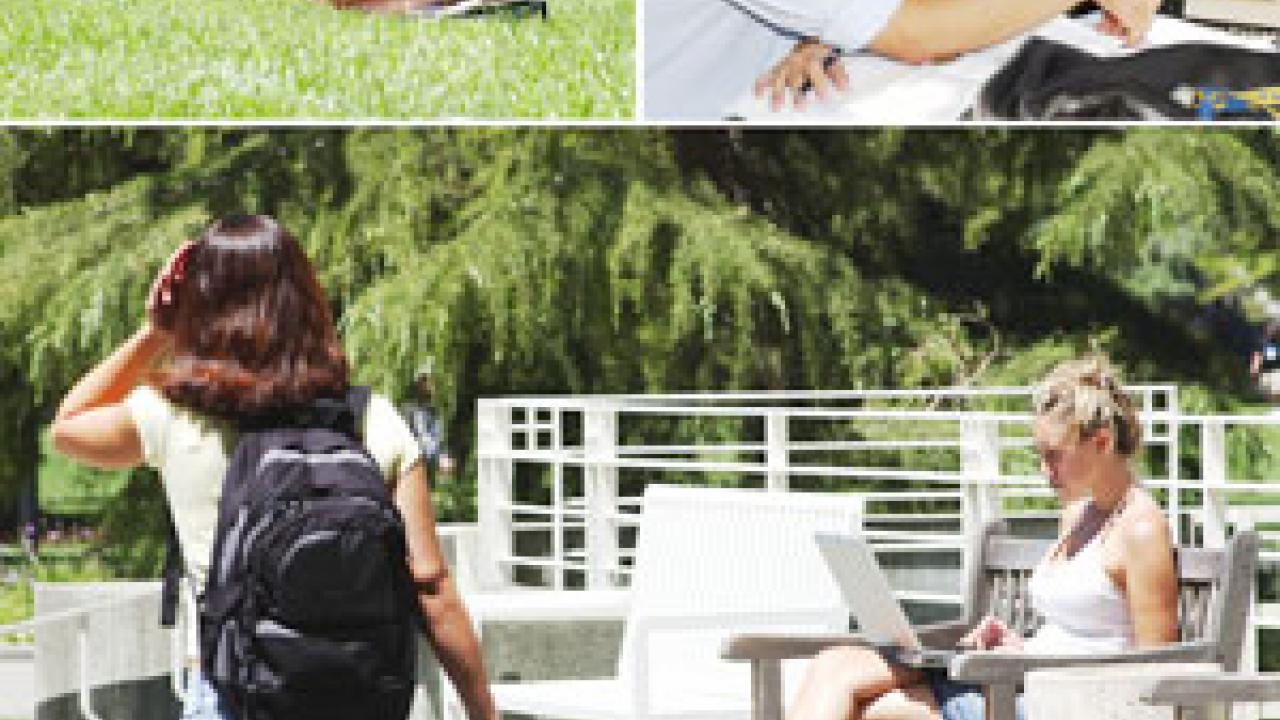While many UC Davis students are working, traveling or at the beach this summer, more than 10,000 of them will be hitting the books the next couple months.
A record-high number of students have so far enrolled in UC Davis' 2003 Summer Sessions, up from 8,500 last year to 10,196 this year. By comparison, UC Davis enrolled 22,750 undergraduate students for the Fall 2002 term.
The reasons for the increase, say campus administrators, include a greater number and variety of course offerings, a discount on fees, and newly available financial aid. Indeed, expanded summer instruction will be a key component of the University of California's efforts to accommodate enrollment growth over the next decade.
Anh Thu Nguyen, a senior in psychology, said she signed up for summer session based on affordability and convenience.
"I'm already here in Davis," said Nguyen, "so why not go to school and finish my degree? I only need three courses, and it's cheaper when credits after six-units are all free."
Her Davis apartment lease ends in late August, and so it would have been difficult to return in fall term and find housing -- all for just three classes, she said. Now she'll just take those courses over the summer.
"I need to finish, finally," said Nguyen, noting that if she weren't attending school now she'd "probably be lounging around or maybe looking for a job" back home in Sunnyvale. She'd like to attend pharmacy school as her next step.
As for Davis in the summer, well ... "It's hot here, but at least my roommate is around or I'd be alone."
As the case of Nguyen illustrates, the idea behind the summer program is to help students complete course requirements for their undergraduate majors. Many courses that are often crowded or filled up during the academic year are readily available for summer students.
"Last year our campus saw a tremendous growth in our summer programs -- thanks to the efforts of many committed individuals," said Provost and Executive Vice Chancellor Virginia Hinshaw. "This summer we are witnessing another major increase at a level higher than we had anticipated. For that purpose, additional investments are being made to ensure that the summer experience will be a positive one for students, faculty and staff."
Last year, the state Legislature set enrollment targets for summer programs at the UC campus. At UC Davis, the enrollment target was a 30 percent increase in summer students over the prior year. In fact, the campus registered a 60 percent increase, said Dan Wick, director of Summer Sessions.
As a result, the university will receive additional state funding, which makes financial aid available to summer students, unlike in past years.
UC Davis Summer Sessions are offered in two different phases, one from June 23 to Aug. 1 and the other from Aug. 4 to Sept. 12. Courses typically run six weeks but cover the same amount of material as courses offered during the regular academic year.
Expanding courses, enrollments
According to Wick, the number of summer courses offered at UC Davis increased about 20 percent from last year (408) to this year (512).
But don't expect the summer sessions to become full-fledged quarters like those in fall, winter and spring. Not yet, anyway. "I don't think any plans exist to make summer exactly equivalent to the other quarters, though we're certainly broadening our programs and enrollments," Wick said.
Costs this year include a $113 registration fee plus $85 per unit for up to six units. All units taken above those six per session are free, an especially attractive feature for students trying to catch up on courses, take a double major or pursue intensive studies.
Wick said one challenge of Summer Sessions is finding instructors who mirror the faculty profile of those who teach in fall, winter and spring quarters. "The number of ladder-rank faculty teaching in summer is lower than at other times of the year," Wick said. "Summer courses often make greater use of lecturers and graduate student teaching assistants."
One reason for this pattern, he said, is that many ladder-rank faculty are working on nine-month appointments. However, some faculty members have switched around workloads during the traditional school year so they could participate in the summer program, he said.
Summer Session I is slightly more popular, with 7,613 seats filled compared to 6,114 in the second session, Wick said. The average student enrolled in summer programs is taking 9.5 units.
Bill Lacy, vice provost for University Outreach and International Programs, says the campus is continuing in its efforts to implement the year-round school plan. "Expanding instruction during the summer will make efficient use of our facilities, help some students graduate earlier, reduce the impacts of growth during the traditional academic year, and provide innovative new academic opportunities," he said.
He noted that nearly all of the Summer Sessions students are undergraduates.
As for the Severe Acute Respiratory Syndrome outbreak, Lacy says SARS is a serious public health concern and that UC Davis acknowledges that. But the student enrollment from countries now affected by SARS amounted to just a handful of students this summer.
A historical perspective
Historically, the state of California has provided funding for students enrolling in the fall, winter and spring terms -- but not summer. Through summer 2000, summer programs were supported from student course and registration fees set by each UC campus. Now, as a key strategy for handling an expected large increase in student enrollment during the next 10 years, UC has begun converting summer instruction from a self-supporting to a state-supporting program. "The legislators thought this would make for a more efficient use of university resources," Wick said.
"There's a strong possibility that student fees are going to rise in the fall once the state budget is finalized," Wick added. "Viewed in this light, summer courses are a comparative bargain right now."
